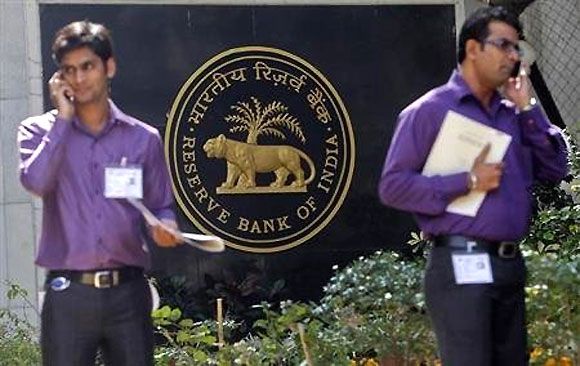 | « Back to article | Print this article |
 In a move that was widely expected as policymakers try to put the improving economy on a firmer footing, the Reserve Bank of India cut rates by 25 bps on Tuesday.
In a move that was widely expected as policymakers try to put the improving economy on a firmer footing, the Reserve Bank of India cut rates by 25 bps on Tuesday.
The Reserve Bank of India lowered the repo rate to 7.25 per cent, as predicted by 35 of 48 analysts polled by Reuters.
Commentary:
Shubhada Rao, chief economist, Yes Bank, Mumbai
"In line with anticipation, RBI has cut the repo rate by 25 bps. Further rate cuts definitely would be contingent on a lot of factors, in terms of the impact of monsoons etc.
"A lot depends on how the government reacts. But at this point, we believe that the first rate cut would be only if there are solid signs of downward pressures on prices."
Ranjan Dhawan, chied executive officer, Bank of Baroda on CNBC TV18
"We'd like to see what happens in the market. You know we did a base rate cut last month...We'd like to see in the next two or three weeks what the action is in the market and accordingly we'll take action. I have to say that demand for credit remains weak. So probably the passing on too will also come in due course of time."
A Prasanna, economist, ICICI Securities Primary Dealership Ltd, Mumbai
"I think the implication of the guidance is that the RBI is going to wait for more inflation data and also for more clarity on risks to inflation. We hold to our call that the RBI will be on pause for the rest of the year until December.
"There is likely to be a partial pass-through from banks. If government wants accelerated pass-through, whole public sector space, separate the stronger from the weaker banks, but that's a policy call the government has to take."
Rupa Rege Nitsure, Group chief economist, L&T Financial, Mumbai
"A repo rate cut of 25 bps was expected and already factored in by most of the market participants. It's consistent with the RBI's cautious stance, as it remains concerned about the monsoon outcome, geopolitical trends and US Fed action. RBI's future actions will be governed by not just the above stated points but also the government's fiscal responses to adverse monsoon outcome and its efforts to push infrastructure growth."
Shakti Satapathy, fixed income strategist, AK Capital, Mumbai
"Almost a stable and convincing front loading action by the RBI and reiterating the medium term inflationary management onus mostly on Government's end. The tone of the policy has been consistent with the last policy guidance primarily based up on key medium term data inflows from the pricing front including active food management strategy and progress of monsoon.
"Going by today's print though, the probability of further cut seems unlikely, the progress of monsoon and government's focus on the supply side and reviving the investment sentiment would be crucial for creating one more room for further easing."
Radhika Rao, Economist, DBS, Singapore
"Besides the as-expected 25 bp rate cut, the RBI's tone errs on the side of caution on the price and growth outlook. Growth projections were revised down a notch, reflecting the central bank's belief that the ongoing recovery trend will be interpreted as modestly positive and not as strong as new headline GDP seems to suggest.
"We reckon that the central bank tapped the available headroom to ease in 1H and is likely to remain in a prolonged pause in 2H15, keeping an eye on domestic and external event risks.
"RBI will also be wary of aggressively loosening policy reins given the likelihood of higher public spending to kickstart the capex cycle and fiscal support to compensate weak agricultural sector (if monsoon disappoint) this year."
Ananth Narayan, regional head of financial, markets, south Asia, Standard Chartered Bank to CNBC TV18
"This is as per the market expectations: a rate cut followed by indications of a long pause. You might get a knee-jerk rally in bonds on the rate cut, but frankly I think markets will settle down to where they were and maybe even weaken a little bit ... I don't really see yields, either in government bonds or corporate bonds, going down significantly from where they were before the policy (meeting): so it begs the question of how much of this can be transmitted by banks, if there is no real change to interest rates through the policy."
